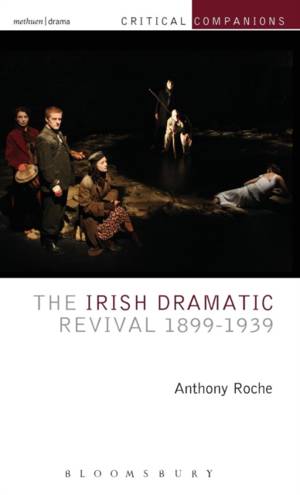
Je cadeautjes zeker op tijd in huis hebben voor de feestdagen? Kom langs in onze winkels en vind het perfecte geschenk!
- Afhalen na 1 uur in een winkel met voorraad
- Gratis thuislevering in België vanaf € 30
- Ruim aanbod met 7 miljoen producten
Je cadeautjes zeker op tijd in huis hebben voor de feestdagen? Kom langs in onze winkels en vind het perfecte geschenk!
- Afhalen na 1 uur in een winkel met voorraad
- Gratis thuislevering in België vanaf € 30
- Ruim aanbod met 7 miljoen producten
Zoeken
€ 203,95
+ 407 punten
Omschrijving
This is a fresh reassessment of the work of the principal playwrights associated with the Irish Dramatic Revival, a movement that was to radically redefine Irish theatre and see the birth of the world's first national theatre, the Abbey, in 1904. The work of O'Casey and Synge has had a profound influence on generations of writers and remains key to the study of modern drama, whereas work by Yeats and Lady Gregory has received renewed attention among theatre makers and scholars owing to their radical innovation and range.
From a consideration of the twin strands of Irish drama prior to the revival, Anthony Roche considers the work of Synge and his experimentation in the creation of a new national drama that drew on native sources while developing a modern and prophetic form of theatre. He explores the role of Yeats as founder and playwright; the role of women and in particular Lady Gregory as producer and dramatist; and the playwrights who emerged following independence. O'Casey's ground-breaking Dublin plays receive detailed consideration, and the new Irish modernism that followed in the 30s and which also witnessed the founding of the Gate Theatre in Dublin.
The Companion also features a number of essays from other leading scholars and contemporary practitioners offering a variety of critical perspectives on this period of radical change and development in modern Irish theatre.
From a consideration of the twin strands of Irish drama prior to the revival, Anthony Roche considers the work of Synge and his experimentation in the creation of a new national drama that drew on native sources while developing a modern and prophetic form of theatre. He explores the role of Yeats as founder and playwright; the role of women and in particular Lady Gregory as producer and dramatist; and the playwrights who emerged following independence. O'Casey's ground-breaking Dublin plays receive detailed consideration, and the new Irish modernism that followed in the 30s and which also witnessed the founding of the Gate Theatre in Dublin.
The Companion also features a number of essays from other leading scholars and contemporary practitioners offering a variety of critical perspectives on this period of radical change and development in modern Irish theatre.
Specificaties
Betrokkenen
- Auteur(s):
- Uitgeverij:
Inhoud
- Aantal bladzijden:
- 272
- Taal:
- Engels
- Reeks:
Eigenschappen
- Productcode (EAN):
- 9781408175279
- Verschijningsdatum:
- 23/04/2015
- Uitvoering:
- Hardcover
- Formaat:
- Genaaid
- Afmetingen:
- 140 mm x 216 mm
- Gewicht:
- 462 g

Alleen bij Standaard Boekhandel
+ 407 punten op je klantenkaart van Standaard Boekhandel
Beoordelingen
We publiceren alleen reviews die voldoen aan de voorwaarden voor reviews. Bekijk onze voorwaarden voor reviews.









